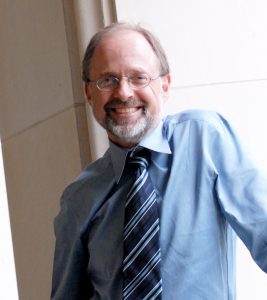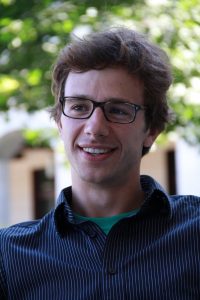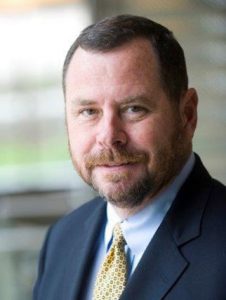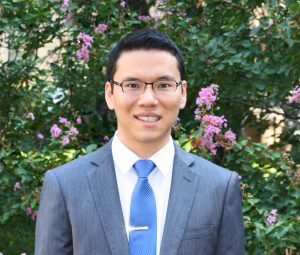 Laura Rosen, BHP 2004, is a Senior Policy Analyst and Outreach Coordinator for the Center for Public Policy Priorities, where she manages program strategy, advocacy, marketing and communications for their job quality and asset building work. Prior to joining the CPPP, Laura worked for Wells Fargo. She completed a master’s degree in public policy with a concentration in social enterprise and economic development from the University of Michigan’s Ford School of Public Policy.
Laura Rosen, BHP 2004, is a Senior Policy Analyst and Outreach Coordinator for the Center for Public Policy Priorities, where she manages program strategy, advocacy, marketing and communications for their job quality and asset building work. Prior to joining the CPPP, Laura worked for Wells Fargo. She completed a master’s degree in public policy with a concentration in social enterprise and economic development from the University of Michigan’s Ford School of Public Policy.
Briefly take me through your career path.
At BHP I discovered microfinance. I was inspired by a community development and social enterprise course taught by Eugene Sepulveda. I felt motivated to use my business skills to give back and do something non-traditional. I received a Fulbright scholarship and worked in Cusco, Peru for a bank providing micro-loans for women starting businesses.
After my time in Peru, I felt I needed to get banking experience, so I went to work at Wells Fargo to get credit skills and ended up working in international trade. I knew that I didn’t want to stay in corporate banking long-term, so I went to grad school to study international development with an emphasis on social enterprise. I discovered a field called asset building, which aligned with my interest in finance. Asset building helps people build both financial and non-financial assets, such as savings and education, so they can reach financial stability. My eyes were opened to how much need there is for this work and how limited the programs are for people. There are only a few positions in Texas that work in this area, but I was lucky enough to land one of those roles with a respected think tank in Texas, the Center for Public Policy Priorities.
In my role there, I have been focused on expanding household savings and financial education in Texas as well as advancing consumer financial protection policies. We have been working to reform payday and auto title lending in Texas for many years. Unfortunately, they remain virtually unregulated. These predatory lenders target low-income families with their payday loans, which average 500 percent APR in Texas. I am also working on trying to expand access to good jobs in Texas. It is so important to have adequate income to be self-sufficient and be able to save for your future. I am excited to work with the business community to try to advance the work. It isn’t sustainable for our economy to have a huge segment of the population that can’t make ends-meet.
You made a big shift in your career from finance to marketing and public policy. How hard was it to start down a new career path?
Graduate school provides a great opportunity to make a shift. Working in banking really helped me build my resume to take the next step. Having private sector experience in finance was helpful and appealing to the non-profit sector when I was moving into policy work. I knew I didn’t want to stay in the banking role I was in, but I think if I had shared more with my manager about what my interests were, I could have maybe moved into some of the philanthropic work that Wells Fargo was doing. Good mentors want to help you get to where you want to go.
How did your master’s degree in public policy complement the skills you gained in BHP and set you up for success in your current role?
The degrees are similar in some ways. They are both professional degrees, but the sectors are just different. The skill set is similar and a lot of what I learned in BHP was transferable, like strategy, writing, presentations and data analysis. I discovered the one of my good friends from BHP, Pamela Chan, transitioned to the non-profit sector and was doing similar work in DC, so she was very helpful to me in getting me to where I am. Some of my BHP friends have also helped me in thinking about next steps in my career. They are such a great network, professionally and personally.
What is most challenging about your role at CPPP?
Working in the non-profit sector is different from the private sector. Resources are constrained, but the need is so vast. The challenge is trying to be effective with fewer resources and be effective with my time by focusing on the right things. I have to wear a lot of different hats.
What do you envision things looking like for the people of Texas if CPPP is successful in their work?
Our mission is to make sure all Texans are healthy, well-educated and financially secure. We have a very long way to go, but it is such important work. There has been a shift in our economy. The share of low-wage jobs in Texas has grown 15% since 1979, while the middle class has shrunk. At the same time, Texas is not adequately investing in public and higher education, which we need to build a skilled workforce. Both of these trends will be detrimental to our state’s economic growth. We would like to see that regardless of where you live, you have the same access to quality healthcare, food, education, etc. that mean so much for your life trajectory. Even nationally less than half of households could cover a $400 unexpected bill. Many people are struggling to manage their money, because they don’t earn enough, but also because they don’t have access to tools and basic benefits that help them save and provide income stability or financial education. Sixty percent of Texans have sub-prime credit scores. Half of Texans don’t have access to a retirement savings plan at work. Forty-five percent of private sector workers in Texas don’t have access to the basic benefit of paid sick days. It would be great if jobs paid enough and provided basic benefits so that families could make ends meet and work to move up the economic ladder.
You were selected as Fulbright Scholar and completed field work in Peru for a year. Tell us about that experience and what you were working on.
I would highly recommend it to people. It was a peak life experience for me. I heard about the opportunity to apply for a Fulbright scholarship and was interested in international work, so I jumped at the opportunity. I conducted research for a small organization in Cusco that operated village banks through the region. Through my research, I studied the impact of why people defaulted on their loans, which gave me the opportunity to interview a lot of people living in extreme poverty. Those interviews really impacted me.
For students interested in going into policy, non-profit or social enterprise work, what would you encourage them to do as students to prepare for that kind of role?
I think it is great to get some experience in non-profit and social enterprise through internships or other experiences. You can always volunteer. Try it out before going to get a master’s. I wish I had figured out what skill sets would be the best fit for me earlier. In grad school we had a course about looking at your strengths and what skills sets you enjoy most. I wish there had been more focus on self-exploration of aptitudes in undergrad. I am happy that I had the business honors degree because a business degree provides a lot of transferable skills and flexibility. I was able to easily transition to something else, and I feel I could always transition back.
I would also add that every year my colleagues and I speak about our work to the UT undergraduate tax practicum class that prepares income taxes for clients at a local non-profit, Foundation Communities. A similar UT business school class inspired my career trajectory, and I really enjoy giving back. Who knows, maybe I will introduce one of the students in the class to a non-traditional career in business like the guest lecturer in my class did when I was a student.
 “’Be the kind of person your dog thinks you are’ ~Robert Prentice” I read as I cracked open my BHP-customized fortune cookie, a part of a playful initiative to encourage ethical behavior at McCombs. Not only is that advice humorous, but credible– If anyone should be fortune-telling over ethics, it is Dr. Robert Prentice, director of BHP, 37-year running professor of Business Law and Ethics, behavioral ethics expert, and dog enthusiast. This week, I sat down with him to find out more about his career, background, and joys in life.
“’Be the kind of person your dog thinks you are’ ~Robert Prentice” I read as I cracked open my BHP-customized fortune cookie, a part of a playful initiative to encourage ethical behavior at McCombs. Not only is that advice humorous, but credible– If anyone should be fortune-telling over ethics, it is Dr. Robert Prentice, director of BHP, 37-year running professor of Business Law and Ethics, behavioral ethics expert, and dog enthusiast. This week, I sat down with him to find out more about his career, background, and joys in life.
 Currently, only BHP seniors have the privilege of learning from Douglas Hannah in class, but that is about to change. Dr. Hannah currently teaches the BHP capstone course MAN 374H, which focuses on business strategy. All BHP students take MAN 374H before graduating, and if you are in Dr. Hannah’s section of the class, studying strategy includes tinker toys and lots of chocolate. Starting in the fall of 2017, sophomore students will also get to enjoy Dr. Hannah’s dynamic and engaging teaching style. Dr. Hannah is developing a new course for first-semester BHP sophomores that will focus on entrepreneurship and creativity. He hopes the class will be a gateway to introduce student leaders to all of the entrepreneurship course offerings, resources, opportunities, and student organizations on campus. The course will include lessons on idea creation and how to turn an idea into a company. According to Hannah, the fundamental skill of entrepreneurship is “how to see something no one else has seen and convince others that it is a good idea.”
Currently, only BHP seniors have the privilege of learning from Douglas Hannah in class, but that is about to change. Dr. Hannah currently teaches the BHP capstone course MAN 374H, which focuses on business strategy. All BHP students take MAN 374H before graduating, and if you are in Dr. Hannah’s section of the class, studying strategy includes tinker toys and lots of chocolate. Starting in the fall of 2017, sophomore students will also get to enjoy Dr. Hannah’s dynamic and engaging teaching style. Dr. Hannah is developing a new course for first-semester BHP sophomores that will focus on entrepreneurship and creativity. He hopes the class will be a gateway to introduce student leaders to all of the entrepreneurship course offerings, resources, opportunities, and student organizations on campus. The course will include lessons on idea creation and how to turn an idea into a company. According to Hannah, the fundamental skill of entrepreneurship is “how to see something no one else has seen and convince others that it is a good idea.” Professor Christopher Meakin teaches LEB 323H- Legal and Ethical Environment of Business. Professor Meakin lights up the classroom with his passion for ethics; from the readings, to cases, to real-life examples in class, Professor Meakin is able to evaluate the ethical challenges that we will all surely face in the business world, and help students come to the best possible solutions. With 28 years of teaching under his belt, and 15 years at The University of Texas alone, Meakin has taught classes ranging from entrepreneurship to negotiations, from law school to business integrity and ethics, and currently teaches both undergraduates and MBA students.
Professor Christopher Meakin teaches LEB 323H- Legal and Ethical Environment of Business. Professor Meakin lights up the classroom with his passion for ethics; from the readings, to cases, to real-life examples in class, Professor Meakin is able to evaluate the ethical challenges that we will all surely face in the business world, and help students come to the best possible solutions. With 28 years of teaching under his belt, and 15 years at The University of Texas alone, Meakin has taught classes ranging from entrepreneurship to negotiations, from law school to business integrity and ethics, and currently teaches both undergraduates and MBA students. Professor Eric Chan teaches Managerial Accounting (ACC 312H) for the Business Honors Program at UT – the second class in the introduction to accounting sequence. Chan’s schooling has brought him around the world: from his hometown in the bustling city of Hong Kong, to grade school in England, undergraduate studies at The University of Maryland, Ph.D. studies at The University of Pittsburgh, and finally to his professorship at The University of Texas at Austin.
Professor Eric Chan teaches Managerial Accounting (ACC 312H) for the Business Honors Program at UT – the second class in the introduction to accounting sequence. Chan’s schooling has brought him around the world: from his hometown in the bustling city of Hong Kong, to grade school in England, undergraduate studies at The University of Maryland, Ph.D. studies at The University of Pittsburgh, and finally to his professorship at The University of Texas at Austin. Laura Rosen, BHP 2004, is a Senior Policy Analyst and Outreach Coordinator for the Center for Public Policy Priorities, where she manages program strategy, advocacy, marketing and communications for their job quality and asset building work. Prior to joining the CPPP, Laura worked for Wells Fargo. She completed a master’s degree in public policy with a concentration in social enterprise and economic development from the University of Michigan’s Ford School of Public Policy.
Laura Rosen, BHP 2004, is a Senior Policy Analyst and Outreach Coordinator for the Center for Public Policy Priorities, where she manages program strategy, advocacy, marketing and communications for their job quality and asset building work. Prior to joining the CPPP, Laura worked for Wells Fargo. She completed a master’s degree in public policy with a concentration in social enterprise and economic development from the University of Michigan’s Ford School of Public Policy.